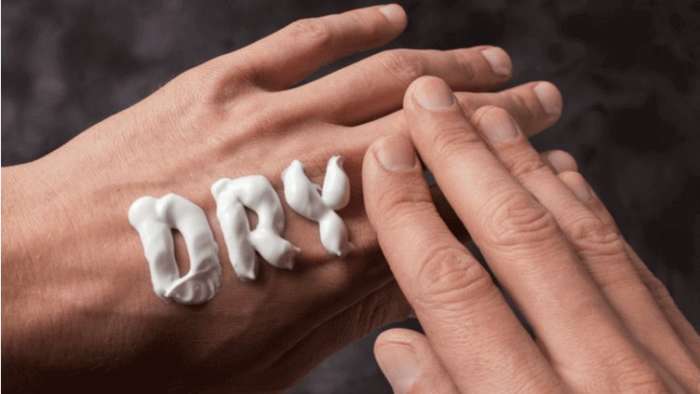
In East Asian Medicine, dry skin is caused either by exposure to excessive dryness and heat (as in the dry heat produced by HVAC systems or radiators) or a deficiency of blood and fluids within the body. These causes can be seen as mutually interdependent, meaning one can make the other worse. Other symptoms of blood and fluid deficiency include brittle hair and nails, constipation, constant thirst or even very light or non-existent periods. If you have dry skin year-round or you experience severe symptoms in the winter, then fluid and blood deficiency are most likely at work and dietary changes, plus both internal and external herbs can help.
Science describes something called the “Dry Skin Cycle” in this way:
Phase 1 – Triggers like low humidity and frequent hand washing lead to “barrier deterioration” aka the loss of water content and flexibility from the top layer of your skin. Natural Moisturizing Factor (NMF), a mixture of substances naturally produced by the skin, which serves as a waterproof barrier, is also damaged. The result of this deterioration is that the skin can’t hold remaining moisture in and water loss increases even more.
Phase 2 – The skin attempts to repair itself by increasing production of new skin cells and releasing pro-inflammatory substances. While this is a protective mechanism, it leads to thicker, scaly skin that is itchy, inflamed and red. This scaly skin is actually even more susceptible to damage than healthy skin, so the cycle just keeps repeating itself.
Now it’s easy to see why it’s so hard to get rid of dry skin once it’s taken hold. To truly break the cycle, you need to treat the symptoms (itchiness and dry, scaly appearance) AND repair the skin’s structure so it can once again serve as a healthy barrier to the elements.
From both eastern and western points of view, what you put in your body, as well as what you put on your body, are very important. In East Asian Medicine, some foods that nourish the blood and fluids (also called the yin) include Aduki and black beans, sesame seeds, eggs, nettle and asparagus. To build and nourish the blood, dark leafy greens, beets, avocado, mussels and red meat are recommended. Regarding red meat: it is seen as very strongly tonifying and just a small 2-4 oz. serving once to twice a week is sufficient in most cases.
Scientific research points to several vitamins and fats important for skin health. Most notably, if you are deficient in EFA’s (essential fatty acids) this will lead to scaly, dry skin and very low moisture levels. The body can’t make EFA’s, so they must be obtained through food. EFA’s are a type of polyunsaturated fatty acid (PUFA). Two examples of PUFA’s are Omega 3 and Omega 6. Dietary sources of PUFA include fish, sunflower oil, flaxseed oil, seeds and most nuts. Although they are beneficial for other reasons, oils such as butter or coconut oil are not classified as PUFAs, and have not been shown to have much effect on skin moisture levels. A lot of the foods considered to be fluid nourishing in East Asian Medicine are also rich in PUFAs.
There are also a few other things that are recommended to help heal dry skin:
- Avoid excessive caffeine and alcohol, as both are quite dehydrating
- Turn your heater or radiator down whenever possible at home, especially while you are sleeping. This will benefit both your skin and your sleep. By the way, the ideal temperature for sleep is between 65 and 72 degrees.
- From an East Asian Medicine perspective, avoiding spicy or bitter foods in excess is also important.
- Get a hand soap that is free of SLS or other detergents, opting instead for gentler vegetable oil based soaps. After washing your hands, gently blot dry or let air dry instead of vigorously towel drying. Both these tips will help prevent stripping of natural moisturizing factor, which is responsible for protecting your skin’s water levels.
- Do your best to eat a well balanced diet, consisting mostly of whole foods and leaning heavily on fruits, vegetables, nuts and sees. All the colors of the rainbow should be on your plate during every meal.
- Drink room temperature water throughout the day to keep your body hydrated and your skin healthy.
If you or somebody you know deals with chronic dry skin, please share this information with them. And don’t forget that East Asian Medicine offers a lot of solutions to the underlying issues contributing to dry skin. Both acupuncture and herbs can be very helpful at stopping dry, itchy winter skin. If you have more questions, please don’t hesitate to contact us. We’re happy to help.

